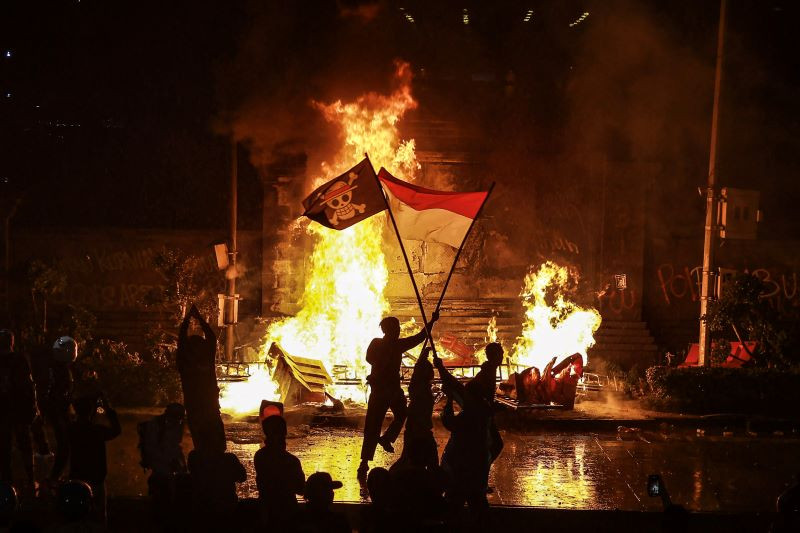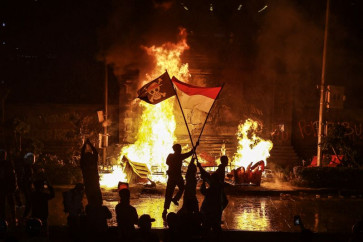Popular Reads
Top Results
Can't find what you're looking for?
View all search resultsPopular Reads
Top Results
Can't find what you're looking for?
View all search resultsThe police are not even the biggest elephant in the room
One year into his presidency, Prabowo's broader agenda is evoking echoes of the "Smiling General".
Change text size
Gift Premium Articles
to Anyone
 Protestors wave the national flag and the Straw Hat Pirates flag from Japanese manga ‘One Piece’ during a violent protest outside the Jakarta Metropolitan Police headquarters in South Jakarta on Aug. 29, 2025, the day after ‘ojol’ (online motorcycle transportation) driver Affan Kurniawan was killed by a Jakarta Police Mobile Brigade vehicle. (Antara/Dhemas Reviyanto)
Protestors wave the national flag and the Straw Hat Pirates flag from Japanese manga ‘One Piece’ during a violent protest outside the Jakarta Metropolitan Police headquarters in South Jakarta on Aug. 29, 2025, the day after ‘ojol’ (online motorcycle transportation) driver Affan Kurniawan was killed by a Jakarta Police Mobile Brigade vehicle. (Antara/Dhemas Reviyanto)
W
earing a bright orange detention uniform, Faiz looked thinner as he stepped out of his cell at the Kediri Police station in East Java. His mother, frailer than before, tried to hide her tears as she greeted the 19-year-old, who has been detained since Sept. 21. Last week, he attended his senior high school class via Zoom from a police room, studying for the final exam that will decide whether he graduates.
Faiz is one of the thousands of students and young activists who have been rounded up since nationwide demonstrations erupted earlier this year. Their crime: demanding accountability from the government.
While police vans roamed the streets chasing the country’s most critical and idealistic minds, President Prabowo Subianto was flying between capitals, shaking hands with world leaders and posing as a peace broker in the Middle East.
The irony is almost unbearable. The same man long accused of abducting and torturing pro-democracy activists in the 1990s is now promoting himself as a mediator for global peace.
One year into his presidency, Prabowo has turned governance into spectacle. The police have become the long arm of a regime obsessed with control while the economy, bureaucracy and even public morality are increasingly run by generals and loyalists from his Gerindra Party. The democratic backsliding that began under his predecessor Joko “Jokowi” Widodo has not only continued, it has been militarized and perfected.
Yet the police, brutal as they are, are not the biggest elephant in the room. The real problem lies deeper, in the economic and political architecture of Prabowo’s Indonesia, a system that feeds the powerful while numbing the public with illusions of prosperity.
From his first day in office, Prabowo has promised to deliver a growth rate of 8 percent, a fantasy figure economists immediately dismissed. The World Bank and the International Monetary Fund project growth of 4.8-5 percent for 2025, constrained by slowing exports, weak household consumption and falling commodity prices.


















